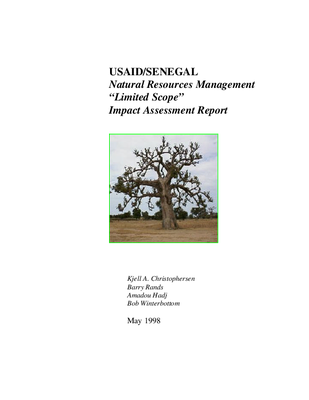USAID/Senegal natural resources management “limited scope” impact assessment report
KEYWORD: Community-based Natural Forest Management, Africa. Africa, Senegal, agricultural diversification, appropriate technology, credit, agroforestry, reforestation, soil conservation, extension, institutional strengthening, policy, training, community based natural resource management, evaluation. SUMMARY: This program planning and evaluation document for USAID/Senegal reviews and assesses the impact of a 5-year USAID investment in natural resources management and related programs in Senegal. NRM activities included: the construction of salt intrusion dams, encouraging the adoption of composting, supporting improved seed production and soil fertility management, training, support for tree planting activities, professional development, support for forestry policy reform, and institutional support. Since 1992, data on household-level estimates of adoption of selected NRM practices were collected from rural producers. Through case studies, the report shows that among other things, extension and development of private sector agricultural enterprises, reforestation and community-based NRM and agricultural research have contributed to the emergence of democratic decision making in rural areas. There has also been greater collaboration between community organizations and rural credit institutions. The authors note an increase in the people using NRM practices in 1998 compared to 1992. Practices that were commonly adopted included live fences, composting, windbreaks, fallows, manures, and field trees (trees planted or natural regeneration conserved in agricultural fields). Results also show that the adoption of NRM practices and the promotion of improved wood stoves to reduce fuelwood consumption have resulted in a reduction in environmental degradation. The use of windbreaks, live fence, field trees have reduced erosion, increased water infiltration rates and fertility, and improved farm microclimates. Specifically, the report notes an increase in rice and sorghum production per hectare and successful extension of NRM training to rural residents. The authors note that the removal of a subsidy on agricultural inputs had a the effect of promoting extensive as opposed to intensive farming and resulted in lower yields. This has caused further degradation of the natural resource base and diminished prospects for food security because the private sector did not provide agricultural inputs at competitive prices. The authors recommend that: USAID/Senegal to focus on removing the major constraints to the creation and development of a vigorous private sector industry in the production of certified seed; USAID should continue support all the remaining activities in the NRM portfolio identified through the participatory approach. SUMMARY:
https://biodiversitylinks.org/library/resources/rmp/library/content/tools/biodiversity-support-program/copy_of_cbnfm/USAID-BDB-cd-2-data/pnace638-senegal.pdf/view
https://biodiversitylinks.org/library/resources/rmp/library/content/tools/biodiversity-support-program/copy_of_cbnfm/USAID-BDB-cd-2-data/pnace638-senegal.pdf/@@download/image/image.png
File
USAID/Senegal natural resources management “limited scope” impact assessment report
Author(s):
Kjell A. Christophersen,
Barry Rands,
Amadou Hadj,
Bob Winterbottom
Publication Date: 1998
DOWNLOAD FILE
KEYWORD: Community-based Natural Forest Management, Africa. Africa, Senegal, agricultural diversification, appropriate technology, credit, agroforestry, reforestation, soil conservation, extension, institutional strengthening, policy, training, community based natural resource management, evaluation. SUMMARY: This program planning and evaluation document for USAID/Senegal reviews and assesses the impact of a 5-year USAID investment in natural resources management and related programs in Senegal. NRM activities included: the construction of salt intrusion dams, encouraging the adoption of composting, supporting improved seed production and soil fertility management, training, support for tree planting activities, professional development, support for forestry policy reform, and institutional support. Since 1992, data on household-level estimates of adoption of selected NRM practices were collected from rural producers. Through case studies, the report shows that among other things, extension and development of private sector agricultural enterprises, reforestation and community-based NRM and agricultural research have contributed to the emergence of democratic decision making in rural areas. There has also been greater collaboration between community organizations and rural credit institutions. The authors note an increase in the people using NRM practices in 1998 compared to 1992. Practices that were commonly adopted included live fences, composting, windbreaks, fallows, manures, and field trees (trees planted or natural regeneration conserved in agricultural fields). Results also show that the adoption of NRM practices and the promotion of improved wood stoves to reduce fuelwood consumption have resulted in a reduction in environmental degradation. The use of windbreaks, live fence, field trees have reduced erosion, increased water infiltration rates and fertility, and improved farm microclimates. Specifically, the report notes an increase in rice and sorghum production per hectare and successful extension of NRM training to rural residents. The authors note that the removal of a subsidy on agricultural inputs had a the effect of promoting extensive as opposed to intensive farming and resulted in lower yields. This has caused further degradation of the natural resource base and diminished prospects for food security because the private sector did not provide agricultural inputs at competitive prices. The authors recommend that: USAID/Senegal to focus on removing the major constraints to the creation and development of a vigorous private sector industry in the production of certified seed; USAID should continue support all the remaining activities in the NRM portfolio identified through the participatory approach. SUMMARY:



